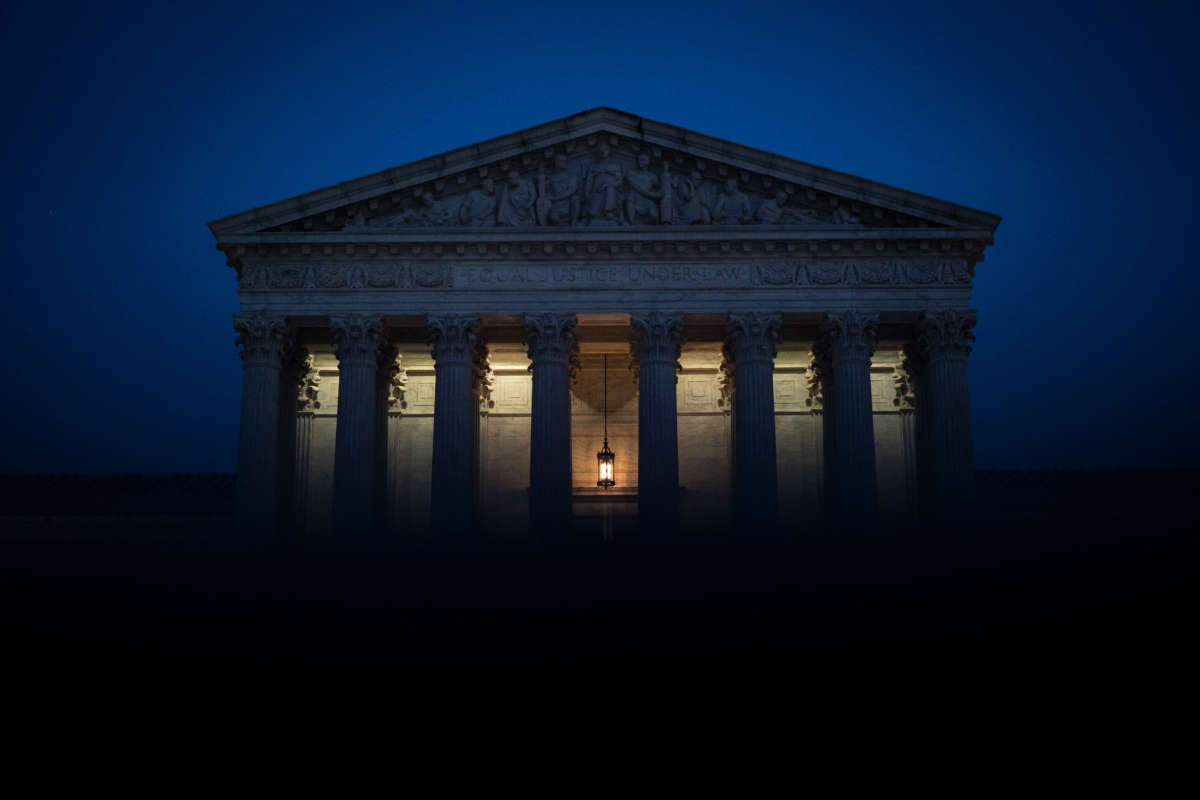Support justice-driven, accurate and transparent news — make a quick donation to Truthout today!
Following the overturn of Roe v. Wade by far right extremists on the Supreme Court this summer, new polling finds that trust in the federal judicial branch, which includes the High Court, is at its lowest level in at least 40 years.
According to a Gallup poll published on Thursday, only 47 percent of Americans say they have a “great deal” or a “fair amount” of trust in the federal judicial branch. This is down 20 points from 2020, and is the lowest amount of confidence that Gallup has recorded since it began measuring confidence in the federal judicial branch in 1972 (though there appears to be a gap between the late ‘70s and ‘90s in which the pollster didn’t measure this particular indicator).
Much of this distrust appears to come from disapproval of the Supreme Court. The poll found that disapproval of the Court is at a record high of 58 percent, while approval is tied with its record low of 40 percent, last seen in 2021.
The disapproval seems to stem directly from the Court’s decision to overturn federal abortion protections in the Dobbs v. Jackson ruling it handed down in June.
Forty-two percent of Americans — also a record high, according to Gallup — think that the Supreme Court is too conservative. For the first time in Gallup’s nearly 30-year history polling this question, the proportion of people who think the Supreme Court is too partisan has exceeded the amount of people who say that the justices’ ideological leanings are “just right.”
The polling follows other findings from Gallup published last month, which demonstrate that approval of the Supreme Court among Democrats has also hit an all-time low at a mere 13 percent.
Gallup’s findings demonstrate the impact of the Supreme Court’s decision to overturn the decades-old precedent set by Roe establishing the right for pregnant people to decide what to do with their own bodies.
That the decision has hurt the public’s view of the Court is no surprise considering that other polls have found that most Americans think that abortion should be legal in most or all cases — and that the consequences of revoking such a right are dire and life-threatening for many.
Only three months after the Dobbs decision was handed down, abortion bans have already impacted people across the country. Children, sometimes victims of rape or incest, have been rejected for an abortion or have had to travel across state lines for the procedure. Meanwhile, people wishing to get medications for reasons other than an abortion have reported being rejected or having to leap through hoops to get their medication, even if the medication is crucial to keeping them alive.
Previous polls have found that the public is eager for Democrats to act to protect abortion rights. Last month, Pew Research Center found that abortion is now a top priority for registered voters in this fall’s midterm elections.
The Supreme Court also handed down a number of other right-wing decisions in this past session that may be driving distrust in the institution, including limiting federal regulators’ jurisdiction over the climate crisis, striking down a New York law regulating concealed gun carry, threatening Native sovereignty, and more.
The Court’s next session, which starts next week, has the potential to be even more consequential and could threaten the fabric of U.S. democracy, judicial analysis warns. The justices are set to hear Moore v. Harper; their decision in this case could completely undermine voting rights by clearing a path for politicians to nearly unilaterally draw gerrymandered district maps. The Court’s ruling in another upcoming case, Merrill v. Milligan, could potentially allow politicians to draw racially gerrymandered maps that discriminate against Black and Brown voters.
Other cases that the High Court has chosen to hear this session could result in the weakening of the government’s ability to protect the environment, the end of affirmative action and the weakening or end of a law that prevents Native children from being forcibly taken away from their families and tribes.
Media that fights fascism
Truthout is funded almost entirely by readers — that’s why we can speak truth to power and cut against the mainstream narrative. But independent journalists at Truthout face mounting political repression under Trump.
We rely on your support to survive McCarthyist censorship. Please make a tax-deductible one-time or monthly donation.
